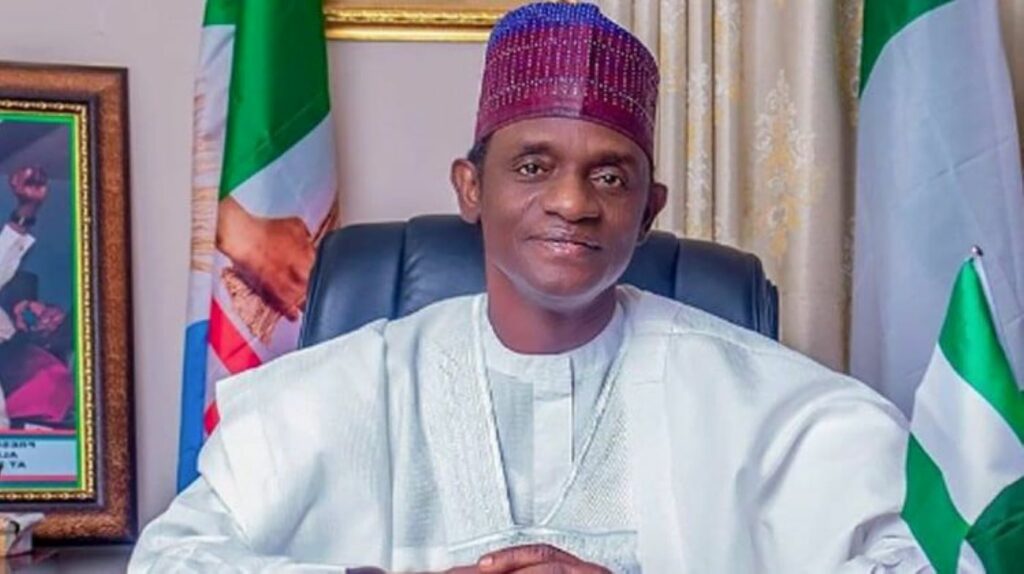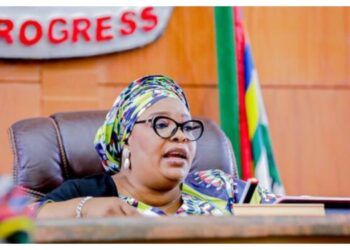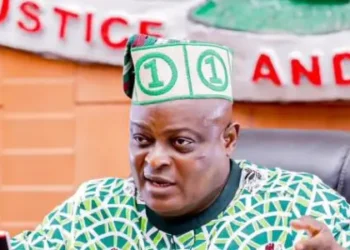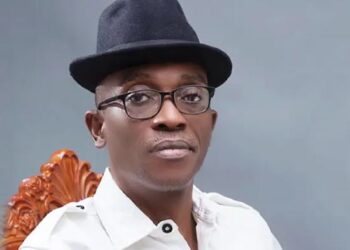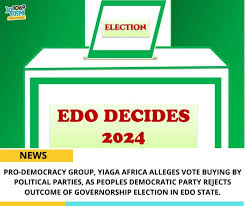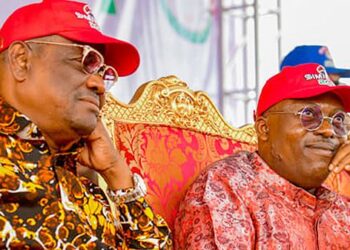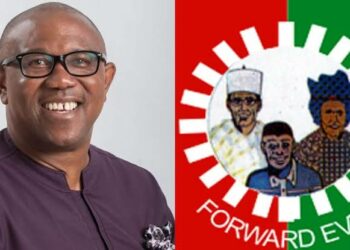Rising from the meeting, the APC said it had agreed on a zoning formula that will swap offices held between the North and the South.
By the arrangement, all offices occupied by northerners in the last eight years, will go to the South and vice visa.
In essence, the South will produce the next presidential candidate of the APC since the incumbent is from the North. It also means that the national chairmanship will go to the North since the last occupant, Adams Oshiomhole, is from the South.
This is as President Buhari directed the party leadership to explore the option of consensus, among other options, in the choice of its national chairman, in line with the party’s tradition.
Briefing State House correspondents on the outcome of the meeting, Kaduna State Governor, Mallam Nasir el-Rufai, said contrary to reports in the media of division among APC governors, agreement had been reached on zoning formula.
Swapping positions between North and South
He said: “We have agreed a zoning formula for all the six geo-political zones. Essentially, northern zone will have the positions the South have had in the last eight years, and vice versa. It is a very simple, equitable and fair formula.
“We will now go back and consult at the zonal levels and look at the positions that are available and the process of the convention preparation will be started in earnest. So, by the grace of God, on the 26th of March, we would have done our national convention.”
The Kaduna governor also affirmed that APC governors were divided over timing of the national convention as some were of the belief that there were many issues left unresolved.
The governor, who spoke in response to a question, said: “Yes, we were divided. We were divided over the timing of the convention, okay. There were some governors that felt that we should put off the convention until we resolve issues about congresses in some states.
“As you know, in some states, these matters are even in court. So, some governors held the view that we should wait until all these are resolved, and this is not borne out of any agenda or selfishness. It is just a realistic proposition to avoid us violating any laws or putting our party structures or elected candidates in danger.
“So, yes, there were differences in opinion about timing. Some of us are saying the Constitution allows us to have convention even if three or four states have issues that are unresolved, while others are saying no, let us finish all the reconciliations and we do this convention. After all, there is no time limit for the convention as long as we do it before the time for the primaries.
“So, that was the difference. This is what the media has called divided governors. In a democratic setting, there is no way you can have 22 governors plus the deputy governor of Anambra State agreeing on any issue. We can have differences.
“But after our meeting of last night, to deliberate on the proposal by the national caretaker committee, and our briefing with Mr. President today, we are all on the same page. We are committed to ensuring that the Peoples Destruction Party doesn’t come back to power.”
Buhari favours consensus — Bagudu
Speaking earlier, chairman of the Progressives Governors Forum and Governor of Kebbi State, Atiku Bagudu, said that President Buhari is in favour of consensus to select candidates for party offices.
He said: “On consensus, Mr. President reminded us that we have produced a number of national chairmen by consensus; Baba Akande emerged as the pioneer chairman of the party by consensus; John Odigie-Oyegun emerged by consensus; Comrade Adams Oshiomhole emerged by consensus.
“So, he is a believer in consensus as one of the options of producing leadership, and he urged us to explore consensus option, so that we can generate the best.
“While recognizing that many people who have indicated interest are equally competent but knowing that just one person will occupy the office, and consensus is part of our Constitution he urged us to work towards consensus.
“And the governors, I have said earlier, have also been working to ensure that as part of equitable arrangement, zoning and consensus are incorporated. We have done that at the lower levels, and even at the national level it’s almost certain that we will achieve it.
“On the date of the convention, the caretaker committee briefed us yesterday of their meeting and the proposed March 26, 2022. Today, the governors informed Mr. President that we have had the briefing from the caretaker committee and we are supportive of their position.”
Bagudu explained that even though the planned zonal congresses of the APC is not provided for in its constitution, the law is also not against the process.
He said: “On proposed zonal congresses not being in the constitution, I think there has been so much debate. Yesterday (Monday), there was a statement to the effect that even the letter that has gone out was withdrawn.
“So, zonal congresses are not explicitly stated in the constitution, particularly how you do zonal congresses. And we have in the past done them with national convention, but nothing again in the Constitution stops them from being done outside the national convention. But the final form will be decided, given the input we have provided.”
Asked to confirm the report that the APC governors were divided, Bagudu said: “Are governors divided? Not at all. The 22 governors of the APC are united. We are in total support of Mr. President, we are appreciative of his leadership, we commend him for his leadership, we are appreciative of the sacrifice of the national caretaker and extraordinary convention planning committee. And we thanked them for the successes recorded under them. Our party, like I said, is greater and stronger, with more members by the day.”
APC won’t collapse after Buhari – Lalong
While also responding to a question, chairman of Northern Governors Forum and Plateau State Governor, Simon Lalong, dismissed fears that the ruling party will collapse at the end of President Buhari’s tenure.
“From the progress report read by our chairman, and several reports, we are seeing the tremendous efforts the Federal Government is making. And again, we’re already going around commissioning projects here and there in the various states.
“Although, you are not specific as to which reason will make us not to come back again, there is no doubt, based on what the Federal Government is doing, there is every hope that this party, this government will move beyond our president. I think that is his efforts, and that’s what he has been saying that by grace of God, this government will move beyond his tenure.”
Eighteen of the governors that were in attendance at the meeting are those of Yobe, Ekiti, Ebonyi, Jigawa, Cross River, Kaduna, Lagos, Borno, Niger, Gombe, Osun, Kebbi, Nasarawa, Kwara, Kano, Imo, Kogi, Ogun, and Plateau states.
The outgoing deputy governor of Anambra State was also in attendance.
The governors of Ondo, Katsina and Zamfara states were not present at the briefing
The meeting was also attended by Vice President Yemi Osinbajo; Secretary to the Government of the Federation (SGF), Boss Mustapha and Chief of Staff to the President, Professor Ibrahim Gambari.
APC’s founding fathers from the 4 legacy parties should decide new APC exco — Okorocha
To resolve the crises ravaging the APC, former governor of Imo State, Senator Rochas Okorocha( APC, Imo West) has said that the founding fathers of the party should be given key positions and carried along in running the APC.
Speaking with journalists yesterday in Abuja, Okorocha said that founding leaders of the party across the original four blocs should be allowed to nominate interested party members for sensitive positions such as national chairman, secretary, women leader, youth leader and organising secretary, etc.
The four legacy parties that came together to form the APC were the Congress for Progressives Change, CPC led by President Buhari; Action Congress of Nigeria, ACN led by Asiwaju Bola Tinubu; All Nigeria Peoples Party, ANPP led by Dr Ogbonnaya Onu and a wing of the the All Progressives Grand Alliance, APGA, led by Rochas Okorocha.
Okorocha said that while President Buhari as the leader of the CPC bloc should be given the honour of deciding who becomes the next National Chairman of the party, others like Senator Bola Tinubu of the defunct ACN bloc, Ogbonnaya Onu of the defunct ANPP bloc, himself as leader of the APGA faction then, should also be honoured by deciding who should be the National Secretary and other important positions.
Okorocha argued that sharing the party’s positions on that basis will help in preventing the ship of the party from hitting the rocks.
“Our party is a great party; APC is a great party, what is wrong with our party is that we have forgotten how we all started, we should not make the mistake of the PDP and I think that will be corrected with the party’s convention now slated for March 26 , 2022. What we need to do is to go back to basics, so that we adhere to the culture of unity and equity the party was known for at formation in 2013.
“Our initial position was that all positions would be shared among these four parties and DPP that came with few members and after the merger, the New PDP joined.
“Now, the wisest thing for all of us to do is to go back to the founding basis and distribute the political positions as we did it that time and there will be no rancour and it will be very peaceful,’’ he said.
PDP mocks APC over postponed convention
Meanwhile, the opposition Peoples Democratic Party, PDP, has taken a swipe at the ruling APC, over the postponement of its national elective convention.
Originally billed to hold February 26, the ruling party, Monday fixed March 26 as the new date for its convention; a development the PDP attributed to confusion in the fold of the APC.
In a statement by its spokesman, Debo Ologunagba, the PDP described APC as a gathering of strange bed-fellows with little or nothing to avail the nation in terms of good governance.
“The continuing inability by the APC, a party in government, to conduct a routine national convention has further explained why all sectors of our national life have been in shambolic state under the incompetent, corrupt, rudderless and overtly confused APC administration.
“APC’s postponement of its national convention, yet again validates PDP’s stance that the APC is not a political party but “a Special Purpose Vehicle, SPV,” of strange bed fellows, “political buccaneers” and ferocious power-mongers on a mission to wreck our nation.
“As a vacuous political contraption without a soul, peopled by “political warlords” without conscience, and operating without rules, the APC is a bunch of inchoate sailors clobbered together for remote personal gain; operating without a Board of Trustees, BoT, and a National Working Committee, NWC; existing in violation of rules while constituting itself to a threat to our national unity and corporate existence as a nation.
“APC’s postponement of its national convention had always been a fallout of the horrible infighting, backbiting and gang war by ‘political bandits’ who are desperate for power and access to our national treasury. That explains why their congresses and other activities are always marred by violence, bloodletting and killings.
“Moreover, the APC is not capable of holding a national convention having become defunct since December 8, 2020 when it dissolved all its states, zonal and national party structures and set up an illegal contrivance called the Caretaker Extraordinary Convention Planning Committee led by Governor Mai Mala Buni of Yobe State.”
Buhari to sign Electoral Bill in hours – Presidency
Following a raging clamour in the polity, the Presidency has assured that President Muhammadu Buhari would sign the re-worked Electoral Act Amendment Bill “in a matter of hours.”
Special Adviser to the President on Media and Publicity, Mr. Femi Adesina, disclosed this yesterday during an interview on Sunrise Daily.
“He (Buhari) will sign it (the bill) any moment from now,” Adesina said while appearing as a guest on the Channels Television breakfast programme.
“It could be today, it could be tomorrow, it could be anytime, but within the 30 days. It could be signed today; it could be signed tomorrow. In a matter of hours, not days. Hours could be 24 hours, it could be 48 hours; not days, not weeks.”
This comes nearly a month after lawmakers in the Senate and House of Representatives chambers of the National Assembly passed the harmonised version of the bill.
Passed on January 25, the bill was transmitted to President Buhari a week after, as confirmed by his Senior Special Assistant on NASS Matters (Senate), Senator Babajide Omoworare.
Weeks after receiving the bill, the President has yet to give his assent – an action that has sparked an outcry from critics who fear he might reject it again.
Defending his principal, Adesina slammed those accusing the President of delaying the signing of the bill, stressing that the Nigerian leader’s action was still within the requirements of the Constitution.
He stated that it would only be appropriate to say President Buhari has acted against the law if it exceeds the 30-day window provided by the law.
“You know before the President will put pen to paper on any legislation, particularly this one that has to do with our electoral fortunes, it has to be looked at and looked at.
“He has to buy opinions from different stakeholders and having been satisfied that the necessary due diligence had been done and he will not be making any error, then he will sign it, and I tell you that Nigerians will get to hear about this bill in hours,” Adesina said.
President Buhari had withheld his assent to the bill in November 2021, citing the cost of conducting direct primary elections, security challenges, and possible manipulation of electoral processes by political players as part of the reasons for his decision.
He, however, gave some conditions to give his assent, prompting the lawmakers to re-work the bill which initially led to the emergence of two versions from the green and red chambers of the assembly.
While the House re-amended the bill to include the direct and indirect primary options, the Senate re-adjusted to include the direct, indirect, and consensus modes of selecting political parties’ candidates.
Both chambers, thereafter, passed the harmonised version – the final agreed version of the amendment to Clause 84 of the bill.
This included the direct, indirect, and consensus primary modes of nominating candidates by political parties for elections.
